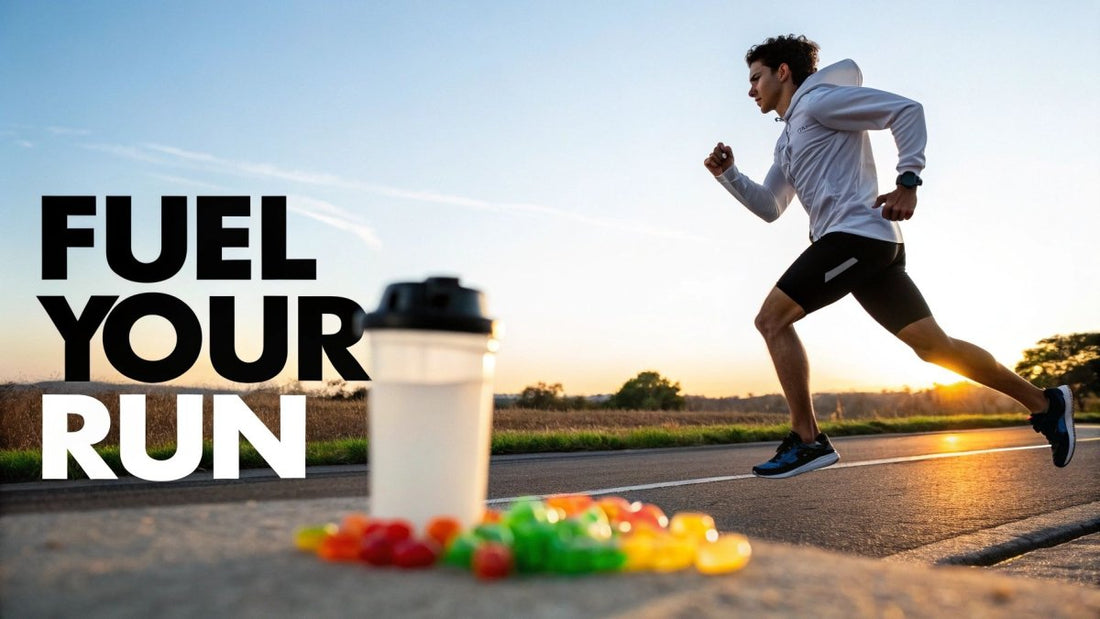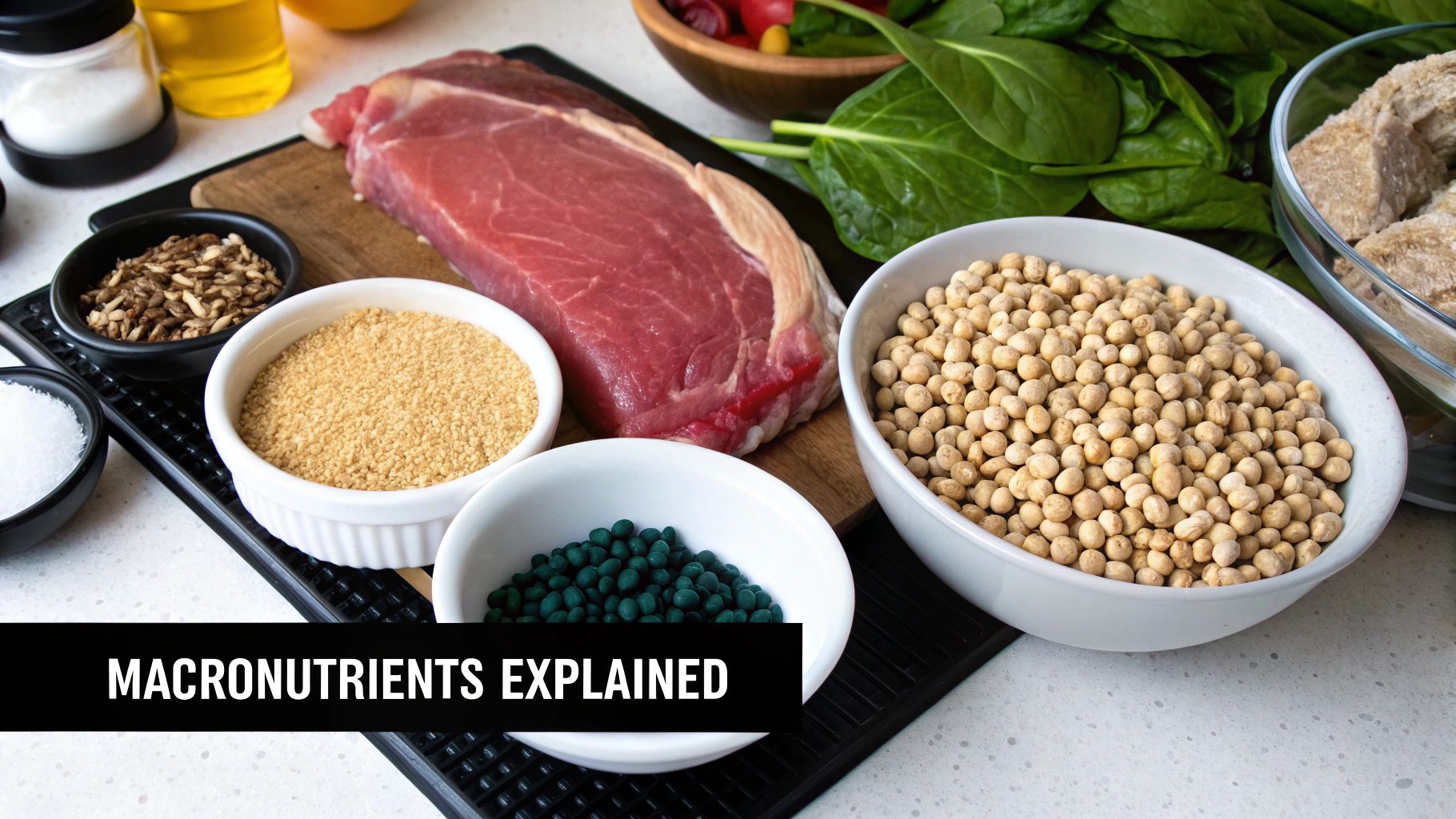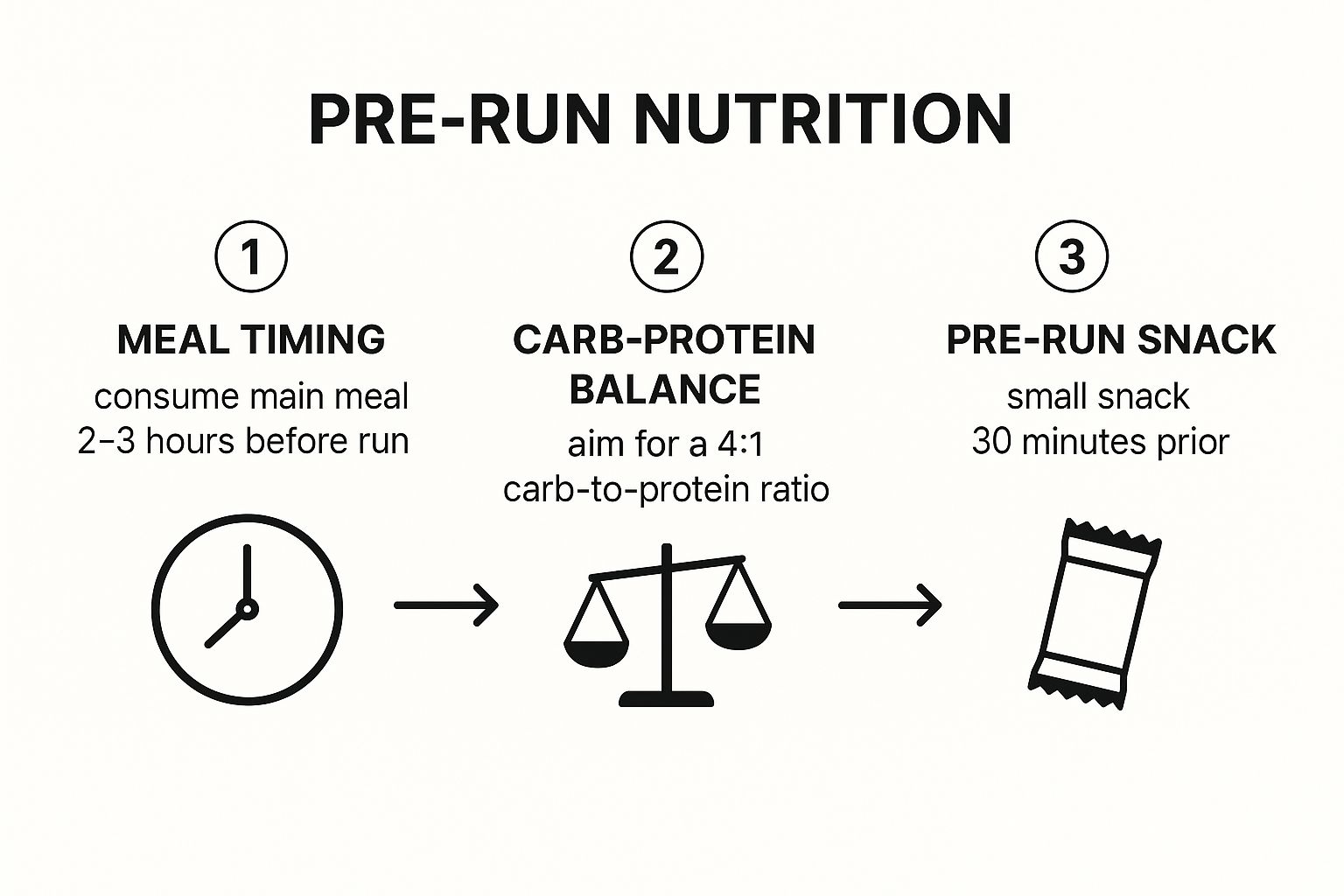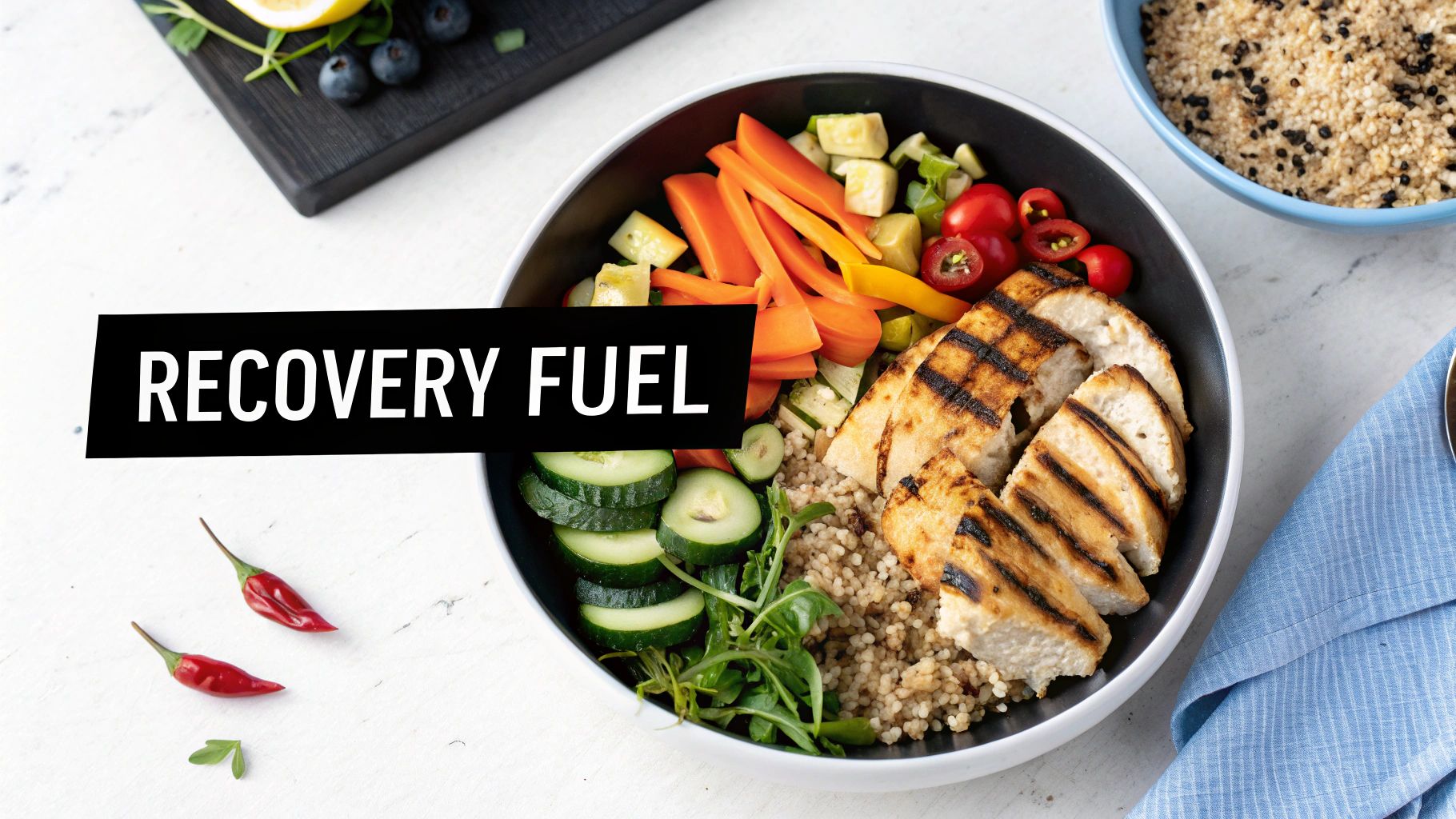
Your Ultimate Running Nutrition Plan
Share
A solid nutrition plan is your secret weapon for better running. It's not about restrictive dieting; it’s about knowing what to eat and when. Think of it as a roadmap to unlocking your potential, built around three core ideas: fueling for energy, recovering with protein, and staying hydrated.
It all comes down to giving your body the right nutrients—carbohydrates, protein, and fats—at the right time to crush your training and hit your race day goals.
The Foundations of a Strong Running Nutrition Plan

Building a nutrition plan that actually works starts with one thing: understanding what your body needs. Your mileage, how hard you’re running, and your personal goals all dictate your fuel requirements. Your body is a high-performance engine, and it demands the right kind of fuel to run at its best.
This isn't just talk; athletes are putting their money where their mouth is. The global sports nutrition market was valued at an incredible USD 49.60 billion in 2024 and is expected to nearly double. This surge shows just how serious athletes are getting about dialing in their nutrition. You can dive deeper into the numbers and read the full sports nutrition market research to see the trend for yourself.
The foundation of any good plan rests on getting your macros right.
Balancing Your Macronutrients
Your plan will live or die by how well you balance your macronutrients: carbohydrates, protein, and fats. Each one plays a unique and non-negotiable role in powering your runs and helping you bounce back. Nailing these ratios is how you find that all-day energy and finally stop hitting "the wall."
To get you started, here's a quick look at how these macros function and a general target to aim for.
Quick-Start Macronutrient Guide for Runners
| Macronutrient | Primary Role in Running | Recommended Daily Intake % |
|---|---|---|
| Carbohydrates | Your main, fast-acting energy source. Stored as glycogen for immediate use during runs. | 50-65% |
| Protein | The foundation of recovery. Repairs muscle damage and helps you build back stronger. | 15-25% |
| Fat | A dense, long-term fuel source for endurance. Also key for hormone and vitamin function. | 20-30% |
This table provides a solid starting point. The key is to see them not as separate entities, but as a team working together to support your training.
Let's break them down a bit further:
- Carbohydrates are your go-to fuel. They’re stored as glycogen in your muscles and liver, just waiting to be tapped into when you start moving. That "bonking" feeling? That’s what happens when you run out.
- Protein is all about the rebuild. Running causes tiny micro-tears in your muscles, and protein is what repairs them, making you stronger and reducing that post-run soreness.
- Fats are your long-haul energy source, perfect for those longer, steadier runs. They also do critical behind-the-scenes work, like regulating hormones and helping you absorb vitamins.
The goal isn't to eliminate anything. It's about smart timing. You want to align what you eat with what your training demands on any given day.
Calculating Your Personal Energy Needs
Forget generic calorie counters. Your energy needs are personal. A good way to get a baseline is to figure out your Basal Metabolic Rate (BMR) and then factor in the calories you burn on your runs. As a rough guide, a 150-pound runner burns about 100 calories per mile.
Think about it: someone running 20 miles a week has vastly different needs than another runner deep in marathon training, logging 50 miles per week. Your plan can't be static. It needs to breathe and adapt right along with your training schedule. This is how you ensure you're always properly fueled for whatever you're taking on.
Timing Your Fuel for Peak Performance
Getting your running nutrition right is more than just knowing what to eat. As any experienced runner will tell you, when you eat is the real game-changer. The right foods are your fuel, but timing is what puts that fuel to work efficiently.
Nailing your nutrient timing means you’ll have the energy to start strong, hold your pace, and bounce back faster. It’s the secret to avoiding those mid-run performance slumps and, just as importantly, the dreaded stomach cramps. Your needs for a quick 5K are completely different from a two-hour long run, so let's break down how to time it all perfectly.
Fueling Before Your Run
Think of your pre-run meal as topping off your glycogen stores—the high-octane carbohydrate fuel sitting in your muscles and liver. Starting with a full tank makes a huge difference in how strong you feel and can push fatigue much further down the road.
The trick is to stick with easily digestible carbohydrates. You want to avoid too much fat, fiber, or even a large amount of protein right before you head out, as these can slow digestion and lead to discomfort.
If you have time for a proper meal, eating 2-3 hours before your run is the sweet spot. This gives your body plenty of time to digest everything. For those early morning runners, though, a full meal isn't practical. A smaller snack is the way to go.
- Morning Runners: Grab a small, carb-heavy snack about 30-60 minutes before you lace up. Half a banana, a piece of toast with jam, or a few bites of oatmeal are all great choices.
- Afternoon/Evening Runners: You've got an advantage here. A well-balanced lunch eaten a few hours before your run sets you up perfectly. Something like a turkey sandwich on whole wheat or a quinoa bowl with roasted veggies works beautifully.
This is a great visual breakdown of how to think about preparing for your run.

It really highlights how both what you eat and when you eat it come together to make sure that energy is ready right when you need it.
Fueling During Your Run
For most runs under about 60-75 minutes, you’re probably fine. Your stored glycogen and a solid pre-run snack should be enough to carry you through. But once you start pushing past that 90-minute mark, you’ll need to refuel on the move to avoid "hitting the wall."
A good rule of thumb is to take in 30-60 grams of carbohydrates per hour after that first hour. This isn’t the time for a real meal; you need simple, fast-acting carbs that your body can absorb quickly.
Your long runs are the perfect dress rehearsal for race day. Never, ever try a new gel, chew, or sports drink for the first time during a race. Use your training runs to figure out what your stomach can handle.
Some of the most popular and effective options are:
- Energy Gels: They're concentrated, convenient, and get to work fast.
- Chews or Gummies: A great alternative if you prefer something with a bit more texture.
- Sports Drinks: These are fantastic because they deliver both carbs and essential electrolytes.
The Critical Post-Run Recovery Window
What you do after you stop your watch is just as crucial as everything you did before. That first 30-60 minutes after a tough or long run is often called the "recovery window." During this period, your muscles are like sponges, ready to soak up nutrients to kickstart the repair process.
Don't panic if you miss it—it won't derail your training. But taking advantage of this window can seriously speed up your recovery, cut down on muscle soreness, and help you come back stronger for your next workout. The goal is simple: replenish your glycogen and get some protein in for muscle repair.
A snack or meal with a carb-to-protein ratio of around 3:1 or 4:1 is ideal.
Practical Post-Run Recovery Snacks:
- Chocolate milk (it's a classic for a reason!)
- A smoothie made with fruit and Greek yogurt
- A bagel with peanut butter
- A bowl of Greek yogurt topped with fresh berries and granola
By dialing in your timing, your nutrition plan becomes more than just a list of foods. It transforms into a dynamic strategy that actively boosts your performance and recovery every single time.
Crafting Your Daily Meal and Hydration Strategy

Alright, now that you've got the basics of nutrient timing down, let's get into the nitty-gritty of building a daily meal and hydration plan that actually works. A smart nutrition strategy isn't about following a strict, joyless diet. It's about creating a flexible blueprint that fits your training schedule, your taste buds, and your life.
Think of your entire day as a support system for your runs. This mindset is catching on in a big way—the endurance sports nutrition market is projected to skyrocket to USD 114.62 billion by 2034. That's not just a random number; it shows a massive shift toward using strategic daily eating to get a real edge in performance and recovery.
So, let's map out what a solid day of fueling actually looks like on your plate and in your water bottle.
Building Your Plate From Breakfast to Dinner
You don't need complicated recipes or a pantry full of exotic ingredients. Your daily meals should be simple, balanced, and—most importantly—effective. The goal here is consistency, steadily supplying your body with the carbs, protein, and healthy fats it needs to perform and repair itself.
Here are a few powerhouse meal ideas you can mix and match throughout the week:
- Breakfast: Start your day strong with a mix of quality carbs and protein. Think oatmeal loaded with berries and a scoop of nut butter, a couple of scrambled eggs with whole-wheat toast and avocado, or a Greek yogurt parfait layered with granola.
- Lunch: This meal is critical, whether you're refueling from a morning run or prepping for an afternoon session. A big salad topped with grilled chicken or chickpeas works great. So does a quinoa bowl with roasted veggies and a lemon-tahini dressing, or a simple turkey sandwich on whole-grain bread with a piece of fruit on the side.
- Dinner: Your last meal of the day is all about recovery. Focus on a lean protein source, some complex carbs, and plenty of vegetables. Good examples include baked salmon with a sweet potato and broccoli, a chicken and veggie stir-fry over brown rice, or a hearty lentil soup.
Looking for more inspiration, especially for that crucial pre-run window? Check out our guide on delicious and effective pre-workout meal ideas.
The Art of Strategic Snacking
Snacks are so much more than just a way to curb hunger pangs. For a runner, they're tactical tools. They bridge the gap between meals, keep your blood sugar from crashing, and deliver targeted fuel right when you need it. A well-timed snack can honestly be the difference between a sluggish, painful run and a strong, energized one.
Think of snacks as mini-meals with a specific job. A pre-run snack should be mostly carbs for quick energy. A post-run or mid-afternoon snack, on the other hand, should have some protein to kickstart muscle repair.
Effective Snack Examples:
- An apple with a tablespoon of peanut butter
- A banana and a small handful of almonds
- Cottage cheese with sliced peaches
- A hard-boiled egg with a few whole-grain crackers
These options give you that perfect blend of macros to keep you fueled and satisfied all day.
Mastering Your Hydration Game
Hydration isn't just about chugging water when you feel thirsty—by then, it's often too late. For runners, staying properly hydrated is a cornerstone of performance, impacting everything from your energy to your muscle function. Even a 2% loss in body weight from dehydration can tank your performance.
Your hydration plan needs to be an all-day commitment. Start your morning with a big glass of water and keep a bottle handy from there on out.
To really dial it in, you need to get personal with two key things: your sweat rate and your electrolytes.
1. Calculate Your Sweat Rate
This sounds technical, but it’s simple. It tells you exactly how much fluid you’re losing. Weigh yourself with minimal clothing right before a one-hour run. Don’t drink anything during the run. When you get back, weigh yourself again. The difference in weight is a great approximation of your hourly sweat loss, giving you a personalized target for rehydration.
2. Prioritize Electrolytes
When you sweat, you lose more than just water; you lose critical minerals called electrolytes. For runners, sodium is the most important one to replace. Electrolytes are what help your body actually absorb and hold onto fluid, preventing cramps and keeping your nerves firing correctly.
- Eat electrolyte-rich foods daily, like bananas (for potassium), salted nuts, and yogurt.
- For any long or particularly hot run, consider adding an electrolyte drink mix or tablet to your water to replenish what you’ve lost.
Learn to spot the early signs of dehydration—dark-colored urine, unusual fatigue, or a nagging headache. Getting ahead of it is the key. By making these meal and hydration habits part of your daily routine, you build a powerful nutrition plan that supports every single run.
Integrating Supplements to Support Your Running

Let’s be clear: a solid diet built on whole foods is non-negotiable. That's your foundation. But when you’re pushing your limits, the right supplements can give you a serious edge. Think of them as your support crew—not a replacement for real food, but targeted tools to fill gaps, accelerate recovery, and unlock that extra bit of performance.
Diving into the world of supplements can feel like a maze. The good news? You only need to focus on a few evidence-backed options that consistently deliver for runners. These aren’t magic potions, just concentrated nutrients that help your body handle the grind of training.
It's all about smart integration. This approach is catching on, too. The market for complete nutrition products, valued at an estimated USD 5.92 billion in 2025, is expected to nearly double as more athletes turn to specialized products to fine-tune their performance. You can read more about this trend in a detailed complete nutrition products market report.
Common Supplements for Runners and Their Uses
To simplify things, let's look at some popular supplements that runners often rely on. The table below breaks down what they do and the best time to take them to get the most out of your efforts.
| Supplement | Primary Benefit for Runners | Optimal Timing |
|---|---|---|
| Protein Powder | Accelerates muscle repair and reduces soreness | Within 60 minutes after a hard run |
| Electrolytes | Prevents cramping and maintains hydration | During long or hot runs (over 60 mins) |
| Energy Gels/Chews | Provides quick, accessible energy to prevent bonking | During runs lasting over 90 minutes |
| Creatine | Boosts power for sprints, hills, and finishing kicks | Daily (timing is flexible, consistency is key) |
Remember, each of these serves a specific purpose. They are designed to work alongside your whole-food meals, not in place of them.
Key Supplements for Your Running Toolkit
When building out your supplement stack, think about your specific needs. Are you training for an ultra? Focusing on a new 5K PR? Your goals will dictate what you need most.
Here are a few staples every runner should consider:
-
Protein Powders: A good whey or plant-based protein is your best friend after a tough session. Aiming for 20-30 grams within an hour of your run jump-starts the muscle repair process, so you can bounce back stronger.
-
Electrolyte Tablets: Sweat isn't just water; it's full of essential minerals like sodium and potassium. Dropping an electrolyte tablet into your water bottle on long or hot runs is a simple way to stay hydrated, keep cramps at bay, and maintain your body's fluid balance.
-
Energy Gels and Chews: For any run stretching past the 90-minute mark, you'll need fuel on the go. Gels and chews offer a quick hit of easily digestible carbs to keep your glycogen stores topped off, helping you dodge that dreaded "wall."
My takeaway: Supplements are just that—supplemental. They are there to enhance an already solid nutrition plan by delivering targeted nutrients right when your body needs them most.
The Runner's Edge: Creatine
Creatine has a reputation for being a bodybuilder's supplement, but it’s an incredible—and often overlooked—tool for runners. Its main job is to help your body rapidly produce ATP, which is the fuel for short, intense bursts of effort. For us runners, that translates directly into more power for hill repeats, track intervals, and finding that extra gear for a strong finish.
By boosting your capacity for high-intensity work, creatine helps you get more out of your speed workouts, which ultimately improves your overall running economy. It's especially valuable during training blocks where you're really trying to build speed and power.
Many people, particularly women, wonder if there are benefits beyond just power. Absolutely. Creatine also helps your muscles store more glycogen and can even provide a cognitive boost. If you want to learn more, our guide on the complete benefits of creatine for women is a great resource.
The best part is how easy it has become to take. With options like creatine gummies, staying consistent is a breeze. A simple daily dose of 3-5 grams is all you need to keep your muscles saturated and ready for action. Since creatine works by building up in your system over time, daily consistency is far more important than exact timing. Just make it part of your daily routine—maybe with breakfast or your post-run meal—and you'll be set to smash your next goal.
Fine-Tuning Your Fuel for Race Day and Recovery
https://www.youtube.com/embed/NO-EbXMB4gc
After all those weeks of disciplined training and dialing in your daily nutrition, it all comes down to a single day. But here's the thing: your fueling strategy for the final stretch—the days leading up to the race and the critical hours after—can't be the same as your everyday training plan. This is where we get surgical, priming your body to perform at its absolute peak.
Getting this right is what separates a good race from a great one. It’s not about finding some last-minute magic food. It's about strategically tweaking the trusted fuel sources you’ve been using all along to max out your energy stores and lay the groundwork for a speedy recovery.
The Art of Carb-Loading
Carb-loading is a classic for a reason. It's the proven method for cramming your muscles full of glycogen—the high-octane fuel that powers you through long-haul endurance efforts. The whole point is to super-saturate your muscles with energy so you can push fatigue further down the road. This process really kicks off 2-3 days before your race.
During this window, you’ll want to shift your macros so that carbohydrates make up about 70% of your total daily calories. For those who prefer more precision, a great target is 8-10 grams of carbohydrates per kilogram of body weight.
But successful carb-loading isn't just about eating a mountain of pasta.
- Stick to What You Know: This is not the time for adventure. Choose simple, easy-to-digest carbs your stomach is already friends with. Think white rice, pasta, potatoes (peeled!), and plain white bread.
- Cut Back on Fiber and Fat: In the days right before your race, ease up on high-fiber foods like beans, lentils, and veggies like broccoli or cauliflower. This simple step helps you sidestep any race-day bloating or digestive drama.
- Don't Stuff Yourself: A common rookie mistake is to just eat more of everything. Remember, you’re tapering your running, so your overall calorie needs are actually lower. Keep your total calories about the same as a normal training day, but make sure the vast majority comes from carbs.
A proper carb-load should leave you feeling energized and light, not bloated and heavy. Make your last big meal the lunch on the day before the race, followed by a smaller, simple carb-focused dinner. This gives your body plenty of time to process everything.
Nailing Your Pre-Race Breakfast
Your pre-race breakfast is arguably the most important meal of your entire race cycle. Its sole purpose is to top off the liver glycogen stores that you burned through overnight and to keep your blood sugar stable for the starting line.
Make sure you eat this meal 2-4 hours before the starting gun. This is a non-negotiable rule; it gives your body the time it needs for full digestion.
The meal itself should be packed with carbohydrates but low in fat, fiber, and even protein. This ensures you get quick energy without putting your digestive system to work when it should be resting.
Winning Pre-Race Breakfast Ideas:
- A plain bagel with a thin spread of jam or a drizzle of honey.
- A bowl of instant oatmeal made with water, topped with half a sliced banana.
- Two slices of white toast with a very light smear of peanut butter.
The mantra for race morning is simple: tried and true. Never, ever experiment with a new food, gel, drink, or supplement on race day. You should have rehearsed your exact pre-race meal several times before your longest training runs. This approach is a cornerstone of any solid running nutrition plan, and for those going the distance, our complete marathon nutrition plan guide dives even deeper.
Kickstarting Your Recovery
The second you cross that finish line, the recovery clock starts ticking. What you put into your body in the first few hours is absolutely vital for restocking your energy, repairing muscle damage, and taming inflammation.
Your immediate focus should be on two key players: carbohydrates and protein. Aim to get in a snack or small meal with a 3:1 or 4:1 ratio of carbs to protein within 30-60 minutes of finishing your race.
This is often called the "recovery window," and it’s when your muscles are incredibly receptive to soaking up nutrients.
- Refill the Tank: You’ve just burned through a massive amount of stored glycogen. Quick-acting carbs from fruit, a sports drink, or even a classic can of soda will kickstart the replenishment process.
- Repair the Damage: Your muscles have taken a beating. Getting 20-30 grams of high-quality protein will supply the amino acids they need to start repairing all those microscopic tears. A protein shake or chocolate milk are fantastic, easy-to-digest choices.
Beyond what you eat and drink, consider adding some physical therapy to your recovery toolkit. Many runners swear by professional sports massage treatments in the days after a big race to ease soreness and get muscles working properly again. And of course, rehydrate! Start sipping on water and electrolyte drinks right away to restore your fluid balance. By making your post-race nutrition a priority, you'll bounce back faster, stronger, and ready for the next challenge.
Common Running Nutrition Questions, Answered
Even with the most meticulously crafted plan, questions are going to come up. It's totally normal to wonder if you're on the right track or how to tweak your strategy when life (or a race) throws you a curveball. Think of this as your go-to guide for those tricky, real-world running nutrition scenarios.
We'll tackle some of the most common questions I hear from runners. From fueling for different distances to dodging the dreaded runner's stomach, let's get you some clear, actionable answers.
How Should My Nutrition Change for a 5K vs. a Marathon?
This is a big one, and the answer is simple: they are two completely different beasts. Fueling for a 5K versus a marathon is like packing for a quick day hike versus a week-long trek through the mountains. Your needs change dramatically.
For a 5K, your everyday healthy diet is almost always enough. The race is short, and your body's existing glycogen stores have you covered. The main thing to think about is a light, easy-to-digest carb snack about 1-2 hours before you run. A banana or a piece of toast is perfect—nothing complicated.
A marathon, on the other hand, is a multi-day nutritional mission. It really starts with carb-loading for 2-3 days leading up to the race, where you’ll want to aim for 8-10 grams of carbs per kilogram of body weight. This is all about super-saturating your muscles with fuel. Then, during the race itself, you absolutely have to refuel with 30-60 grams of carbs per hour after that first hour or so to avoid hitting that infamous wall.
What are the Best Plant-Based Protein Sources for Runners?
Plant-based runners have an incredible arsenal of protein sources to choose from. You can absolutely nail your muscle repair and recovery needs without any animal products, you just have to be a little strategic.
Some of my go-to's for athletes include:
- Legumes: Lentils and chickpeas are true powerhouses. They're cheap, versatile, and packed with protein.
- Soy Products: Don't sleep on tofu, tempeh, and edamame. They deliver a complete protein profile, which is a huge win.
- Grains and Seeds: Quinoa is the star here, as it's also a complete protein. I also love adding chia and hemp seeds to smoothies and oatmeal for a boost of protein and healthy fats.
For that all-important post-run recovery shake, a good plant-based protein powder (look for a blend of pea, rice, or hemp) is incredibly effective. It gets those amino acids to your muscles fast, kickstarting the repair process right when you need it most.
How Can I Avoid Stomach Issues on My Long Runs?
Ah, the dreaded GI distress. It's the bane of so many runners, but it’s almost always preventable with a little trial and error. My golden rule is simple: never, ever try anything new on race day. Your long training runs are your dress rehearsals—use them to practice your nutrition!
The first step is figuring out your personal trigger foods. High-fiber, high-fat, and overly sugary foods eaten too close to a run are the usual suspects. Make sure you eat your main pre-run meal at least 2-4 hours before you head out, giving your body plenty of time to digest.
During the run itself, stick to simple, easily absorbed carbs like gels, chews, or a sports drink that you've used and trusted in training. And don't forget that dehydration can make stomach problems so much worse, so staying on top of your fluids and electrolytes is non-negotiable.
If you consistently struggle, keeping a simple food and training log can be a game-changer. Just jot down what you ate, when you ate it, and how you felt on your run. You'll start to see patterns emerge that help you pinpoint exactly what to avoid.
Is Creatine Actually Necessary for a Recreational Runner?
While I wouldn't call it "necessary" in the same way I'd call carbs or water necessary, creatine is a proven tool that can give recreational runners a real performance edge. Its main job is to help your body rapidly produce ATP, which is the high-octane fuel for short, powerful movements.
So what does that actually mean for your running? It translates directly into more power when you need it most.
- Stronger surges on hill repeats.
- More top-end speed during track workouts.
- A much more powerful finishing kick at the end of a race.
A solid diet is always the foundation of a great running nutrition plan. But adding creatine can give you that extra 5-10%, especially if your training includes any kind of intensity or speed work. It helps you get more out of those tough sessions, and that ultimately makes you a faster, stronger runner.
Ready to smash your running goals? A dialed-in nutrition plan is your key, and the right supplements can unlock your next level of performance. At Smash.com, we make it easy with our delicious and convenient creatine gummies. Each serving delivers a scientifically backed 5g of pure creatine to boost your power, speed up recovery, and sharpen your focus—no messy powders or chalky taste. Elevate your training and see the difference for yourself.